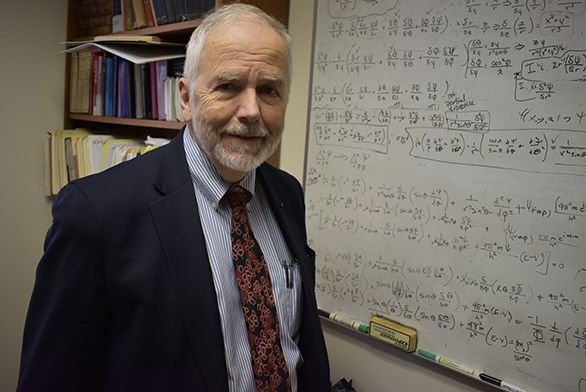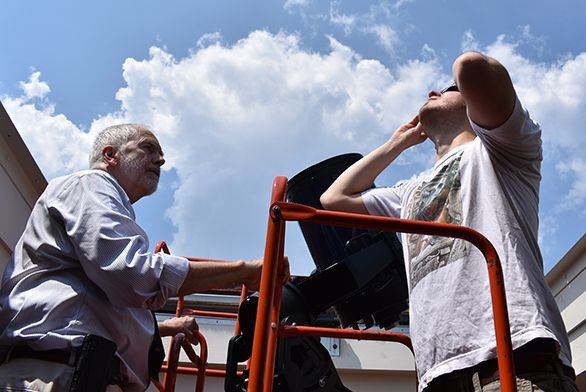The Science of Poetry
January 12, 2018 | By Tim Pratt

St. John’s College tutor Jim Beall recalls standing one day on a mountain top in New Mexico, large, powerful radio telescopes visible in the distance to the west, the first atomic bomb test site way off to the east.
That moment high up in the Magdalena Mountains had a profound effect on Beall.
It led him to write “The Fire on Magdalena Mountain,” a poem featuring vivid descriptions of the scene, and one that is featured in his new book, Onyx Moon.
The book, released on January 9, has earned Beall the 2018 William Meredith Award for Poetry. The award was announced by the William Meredith Foundation the same day the book was released.
“Wind, rain, volcanoes, jungles and mountains appear throughout his poetry, and like Audubon he paints his subjects with exactitude of color and precision of detail,” the foundation said in announcing the award. “Stars shine brightly throughout Onyx Moon as one would expect from a physicist.”
Beall, an astrophysicist, educator and poet, has been writing poetry since he was in high school. Onyx Moon is his third book.
A faculty member at St. John’s since 1982, Beall was a longtime friend and colleague of Meredith, whom the foundation and award commemorate.
Meredith was the former Consultant in Poetry to the Library of Congress of the United States, a position which in 1985 became the Poet Laureate Consultant in Poetry to the Library of Congress. He died in 2007.
Beall met Meredith in 1978 at a poetry reading in the Folger Library. At the time, Beall was a congressional science fellow at the Office of Technology Assessment for the U.S. Congress; Meredith was the Consultant in Poetry to the Library of Congress.
The pair soon began a collaboration that led to the Science and Literature Symposium in 1981. The program featured lectures by George Wald, the Nobel Laureate in chemistry; O.B. Hardison, then-director of the Folger Library; Sir Fred Hoyle, a famed astronomer and writer; Gerry Pournelle, a science-fiction writer; and Gene Roddenberry, creator of the Star Trek TV series.
Beall served as co-moderator for the symposium and recalls hosting the group—a who’s who in the science and literature worlds—at his home. He eventually wrote about the scene in the title poem of his second book, Republic, published in 2010.
Beall says his poetry is often influenced by what’s happening around him.

One poem, “Red-Winged Black Bird at Gettysburg Field,” was inspired by a trip to the historic Civil War battlefield, including a tour by the great-great-grandson of a soldier who fought in Pickett’s Charge.
Beall also can’t help but let a bit of science seep into his work. He has maintained a lengthy career in astrophysics.
“I don’t intentionally write about scientific topics, but it’s just part of my life in the same way the books here (at St. John’s) and the texts and the classes are a part of my life,” he says.
Beall says he is honored to receive the Meredith Award for his work. He and Meredith kept in touch for decades after their 1981 symposium.
“He had a very wry sense of humor,” Beall says. “He was brilliantly intelligent and a masterful poet.”
Beall remembers asking Meredith how many poems he would submit for publication each year. Meredith told him “20 or 30.” Beall then asked Meredith how many of those poems get published.
Meredith replied, “20 or 30,” Beall recalls with a smile.
The Meredith Award is one of many projects supported by the foundation to continue the poet’s legacy. The timing of the award announcement and the release of Beall’s book coincided with what would have been Meredith’s 99th birthday.

